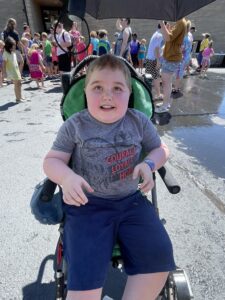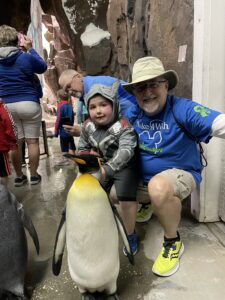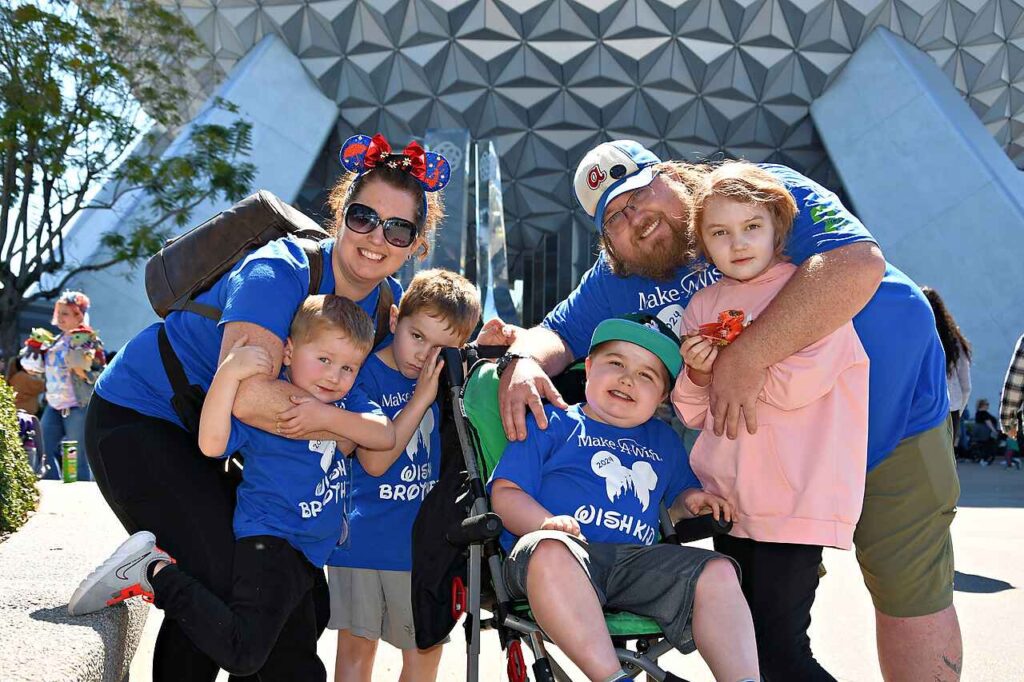Written by Chuck Howe
Nothing in life gives me greater joy than seeing my grandchildren be happy and thrive. You can imagine the heartbreak and fear I experienced when I learned that my grandson, Tucker, was diagnosed with Duchenne muscular dystrophy (DMD) in 2015.

My son Jordan and his wife Jamie first suspected that there was something wrong with Tucker’s health when he was only two years old. While he could walk somewhat like other toddlers, he barely met some developmental milestones and frequently fell over. Tucker’s pediatrician was quick to reassure them that there was likely nothing wrong, but he referred them to a neurologist who ordered a blood test as a precaution. That evening, they were informed that Tucker likely had DMD.
DMD is a rare genetic disorder characterized by progressive muscle damage and weakness. It primarily affects males and symptoms generally begin between ages two and five. The early symptoms of the disorder can include walking difficulties, muscle weakness, leg pain, frequent falls, and fatigue. As the disease progresses, muscle degeneration can worsen. People with DMD may eventually become dependent on wheelchairs and require special assistance with many daily life tasks. Over time, the heart and respiratory muscles can also be affected, significantly shortening life expectancy. While several treatment options for DMD have recently been approved, the disorder has no cure.

The diagnosis was life-altering, not only for Tucker, but for our entire family. Overnight, our focus shifted to ensuring that Tucker has access to the lifelong care he needs. My son and his family traveled to Cincinnati and Seattle to visit specialists who were familiar with DMD. In June 2015, they decided to relocate from Columbia, South Carolina, to Seattle to be closer to Tucker’s medical team. Jamie left her job as a teacher so she could homeschool Tucker and his siblings and Jordan began working nights so that he could take Tucker to his doctors’ appointments during the day. I began providing support by helping to take care of my three other grandchildren and being present for Tucker’s medical appointments.
By 2022, Tucker began experiencing issues with his mobility. The family’s house in Seattle was no longer accessible or safe for him, and we were alarmed to learn how expensive the permits to remodel the home would be. That’s when my wife, siblings, their spouses, and I came up with a unique solution – we were going to hand build a handicap-accessible home from scratch.
My brother designed the architectural plans for the new house and my brother-in-law did all the plumbing and electrical work. It was a huge challenge but eight months later, Jamie, Jordan and their children were able to move into their new home in Salem, Illinois.
While having a home that fit Tucker’s mobility needs took some weight off of our shoulders, it certainly did not fix everything. Tucker’s condition continues to progress, and he requires nearly 24-hour care and has seemingly endless medical appointments. I make it a priority to attend all of Tucker’s semi-annual clinic appointments, where he sees between 11 and 13 specialists. It can be challenging to balance his appointments and daily care demands, but it is essential to ensure that Tucker receives the support he needs.

Despite the challenges Tucker faces because of DMD, he has remained brave, positive and joyful. He is passionate about science, outer space and the weather. When Tucker needed to make biweekly trips to Atlanta for a year so he could participate in a clinical trial, we planned out fun activities for him to look forward to, including riding to and from the airport in cool cars, visiting aquariums and playing games on his iPad during his infusion treatments. When people ask him about his wheelchair, he simply explains to them that his legs do not quite work like theirs do, and he moves on.
Tucker’s ability to cope with the difficulties thrown his way has inspired our entire family to be involved in supporting the DMD community.
About the Author:
Chuck Howe is a biotech consultant and grandfather of six from Atlanta, Georgia. When his grandson, Tucker, was diagnosed with Duchenne muscular dystrophy (DMD) in 2015, Chuck began advocating for DMD awareness and fundraising to support research efforts. He also helps ensure that Tucker receives the medical care he needs. You can learn more about Tucker and our family’s experience with DMD on the TeamSweetT Facebook page.






